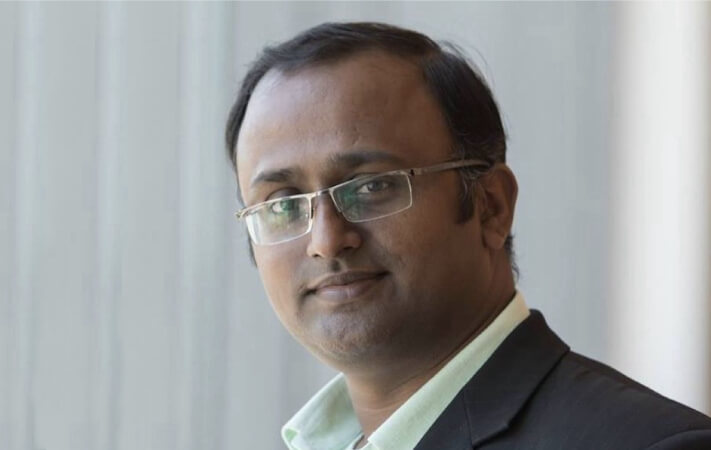Former KAUST postdoctoral fellow appointed as German research ambassador for India

Former KAUST postdoctoral fellow Dinesh Nanaji Sawant recently received an appointment as Deutscher Akademischer Austauschdienst Research Ambassador for India. Image courtesy of Dinesh Sawant.
By David Murphy, KAUST News
Former KAUST postdoctoral fellow Dinesh Nanaji Sawant was recently appointed as a Deutscher Akademischer Austauschdienst (DAAD/German Academic Exchange Service) Research Ambassador for India. Sawant, who was a postdoctoral fellow in the KAUST Catalysis Center (KCC), is currently an assistant professor of applied chemistry at the Indian Institute of Technology (Indian School of Mines), Dhanbad, Jharkhand.
DAAD research ambassadors are senior academicians and scientists who have been involved in advanced research projects in Germany and are interested in promoting research in Germany among peers and students. Newly appointed ambassadors serve as research partners to further academic and scientific cooperation with Germany.
Sawant, who will hold the honorary position for four years (from 2018 to 2022), said he sees his selection as a DAAD Research Ambassador as "a golden opportunity to guide and promote Indian students for research in Germany as well as to interact with academic and research experts from Germany."
"Research Ambassadors help enthuse and inform others about the rich and varied opportunities to conduct research, receive project funding and initiate collaborative projects with colleagues in Germany," Sawant added. "In addition, they serve as role models by informing and inspiring the next generation of students and scholars."
.jpg)
Dinesh Sawant, a former KAUST postdoctoral fellow in the University's Catalysis Center, is pictured here (left) receiving his appointment as a German research ambassador for India. Image courtesy of Dinesh Sawant.
During his time at KAUST from September 2012 to March 2016, Sawant worked under the supervision of Professor Jörg Eppinger in Eppinger's Biological & Organometallic Catalysis Laboratories research group. Sawant's research focus at KAUST centered on investigating the synthesis of artificial metalloenzymes and applications in catalysis.
Before joining KAUST, Sawant completed his Ph.D in chemistry at the Institute of Chemical Technology in Mumbai. Upon completing his P.h.D., Sawant, saw KAUST—with its mixture of cutting-edge research and facilities and world-renowned researchers—as the ideal place to continue his research career.
"After my completing my Ph.D, I had several offers to continue my postdoctoral research in Europe and the U.S. However, the research topic 'synthesis of artificial metalloenzymes and its catalytic applications' offered by Professor Eppinger in the KCC was the main motivating factor for my decision to join KAUST," he said.
"Worldwide, there are only a few groups working in this challenging area," Sawant continued. "In addition to the research topic, the presence of Professor Jean Marie Basset as director of the KCC and the excellent research facilities at KAUST [were other] motivating factors for me joining [KAUST] and staying for such a long time."
.jpg)
Dinesh Sawant, a former KAUST postdoctoral fellow, worked under the supervision of Professor Jörg Eppinger (pictured here) during his time at the University. File photo.
After his postdoctoral research at KAUST, Sawant carried out postdoctoral research in Japan with Nobel Laureate Professor Ryoji Noyori's research group. He also took part in catalysis energy research with Professor Matthias Beller at the Leibniz Institute for Catalysis in Germany.
"I am proud to say that I got these opportunities based on the research work I did at KAUST and the international reputation of KAUST—along with the strong support from Professor Eppinger as well as Professor Basset," he acknowledged.
"KAUST has excellent research laboratories, excellent analytical facilities and the best support and policies for its researchers," Sawant said. "It was a memorable experience to work with people from different countries and cultures and [to] engage in unique scientific interactions."
Sawant is now gradually shifting his research interest from basic research to industrially applicable research.
"As this is an early stage of my career, I am at [a] learning phase; however, for sure in the near future, I will try my best to [produce] innovative catalytic solutions for industrial problems," he concluded.
Related stories:
- KAUST Ph.D. students win best presentation awards
- KAUST Professor J. Carlos Santamarina and postdoctoral fellow Junghee Park receive 2019 Tarek Al-Kasabi Award for Excellence in Civil Engineering in Saudi Arabia
- KAUST alumna's paper recognized by American Statistical Association
-
Postdoctoral Fellow Focus: Anastasiya Bavykina

